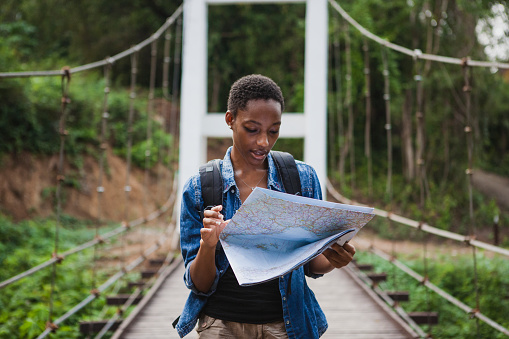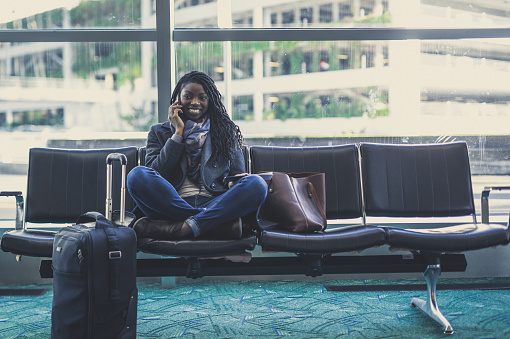This is the year you’ve finally decided you were tired of liking cool pictures of unique destinations on social media and want to see these places for yourself. You want to soak up the sun in Santorini while near the water or have dinner in the sky in Dubai. You’ve got your destination set and your passport just came in the mail but you’re still unprepared. Have you considered traveling while there? Do you need a visa? Is your currency acceptable there?
If you’re planning to travel internationally for the first time, here are some tips to help you get prepared.
1. Check to See If You Need A Passport And A Visa.
Certain countries don’t require a passport for entry because of U.S. ground territory. However, that’s not everywhere. Make sure to check with the Department of State for information about visas, entry requirements, safety precautions, health concerns and more regarding your expected destination. Your passport must be valid for at least six months prior to your trip. Keep all documentation in an easily accessible area and near your passport at all times.
2. Alert Your Bank Of Your Travel Plans
Certain banks like Chase and Bank of America are alerted when your debit/credit card is used outside of the country. They will freeze your account at the most inconvenient moment, and now you’re awkwardly waiting in line at a coffee shop for a text message from your financial institution asking you confirm your identity. Before you head out of the country, contact your bank to let them know when your trip is and where you will be. Also, ask about international transaction fees and conversion rates. Finding out I only spent 2,000 Yuan in Guangzhou, which equates to about $300 U.S. dollars was a great surprise. Also, keep local cash on hand, especially for places like trains, buses or certain markets that don’t accept credit cards.
3. Prepare For Customs
Prior to landing, you will be given immigration forms to complete for entry into the country. This is sometimes the case when traveling from city to city as well. Here is where you will need all of that necessary documentation we talked about earlier: visa number, flight number, departure city, and the address where you will be housed. All of this information will be collected and verified along with your passport. It may seem like a lot, but providing this information will determine whether or not you are granted entry. Any open bottles or snacks from the plane should be discarded upon entry.
4. Download Google Translate And Any Other App Before You Go
You may not always have access to the internet or Google Maps to determine how to get around. Through the Google Translate app, you can type what you want to say and translate it to dozens of languages. If you open the app and hold the camera over another language such as a traffic sign, and it will reveal the words in your chosen native language. It will be your best friend like it was mine in China. I used it to order food or to tell the taxi cab driver where I needed to go.
When needing to communicate make sure you have the necessary apps on hand. Typically, I use Whatsapp when I am out of the country but in Hong Kong most people use WeChat.
5. Pack Light
One mistake I made when traveling between Guangzhou to Hong Kong was not packing lighter. I packed two bags, one medium, one small, not considering the escalators and steps I had to use to get to the train gates. At least I had on comfortable shoes, which made it easier to walk from one end of the platform to the next.
I recommend traveling boxes if you’re pulling around a suitcase. You can fit so much into one box. It saves space and makes your bag a little lighter for carrying purposes.
6. Transportation
Never assume that any place is just like home or that the transportation system is just as simple as it is in the United States. Between language barriers and dialects, the signs may not be in your native language. Certain apps like Google Maps, Uber, Lyft, etc may not be available in other countries. Consider purchasing a guidebook with a map and translation dictionary.

Also, try to make prior travel arrangements from the airport to your housing. I made a decision to jump out of a taxi cab on the side of the road after the driver almost hit a bus twice in traffic because he was falling asleep at the wheel. It was a dangerous situation for me and my friends. Before I knew it, we were lugging our suitcases two blocks to our hotel in the pouring rain. We were soaking wet, our suitcases too, but our limbs were still in tact and we were safe.
7. Trust Your Instincts. If You Feel Unsafe, Leave.
While shopping at the night markets for handbags, two men suggested they had better options at their store. They were attempting to lure us to a back alley. Just at a glance, there wasn’t one light down that alley and if I couldn’t buy it in the light, then I didn’t want it the dark, so I left the area completely. Who knows what would have happened had I actually went, but I was not going to find out.
8. Be Mindful Of Jet Lag
Depending on your destination, you may be extremely jet-lagged from a long flight. It’s been about a week since my 13+ hour flight from Korea to Atlanta. Keep in mind there’s also a 12-hour time difference. I’m still not completely over it. I watched the sun set and rise at least twice this week. I know it may be hard to do while running a business or working a demanding career, but take at least two days once you return to catch up on some good, comfortable sleep. Give yourself time to spread out and relax.
The best way to have a successful, safe trip is to as much research and planning as possible, prior to your trip. Take these tips into consideration and you will be fine. Bon Voyage!
